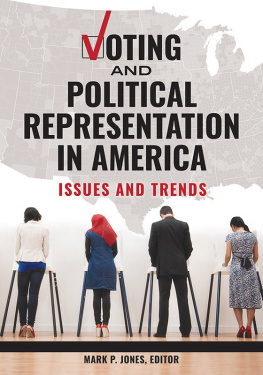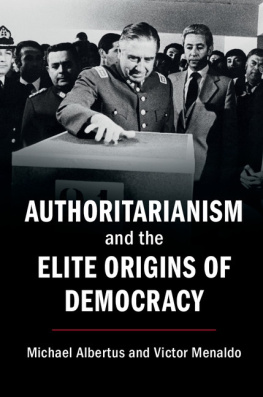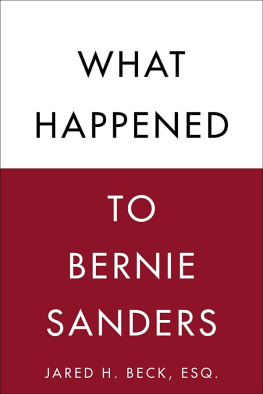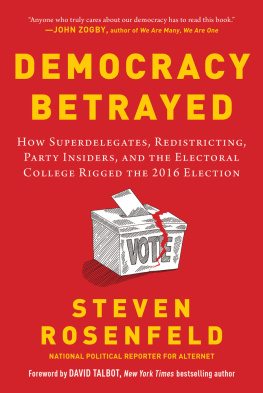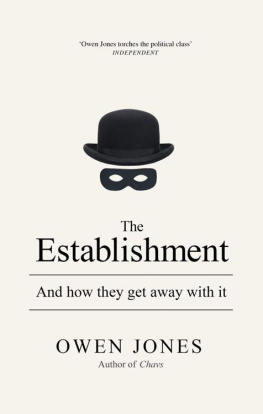10% LESS DEMOCRACY
WHY YOU SHOULD TRUST ELITES A LITTLE MORE AND THE MASSES A LITTLE LESS
GARETT JONES
STANFORD UNIVERSITY PRESS
STANFORD, CALIFORNIA
STANFORD UNIVERSITY PRESS
Stanford, California
2020 by the Board of Trustees of the Leland Stanford Junior University.
All rights reserved.
No part of this book may be reproduced or transmitted in any form or by any means, electronic or mechanical, including photocopying and recording, or in any information storage or retrieval system without the prior written permission of Stanford University Press.
Printed in the United States of America on acid-free, archival-quality paper
Library of Congress Cataloging-in-Publication Data
Names: Jones, Garett, author.
Title: 10% less democracy: why you should trust elites a little more and the masses a little less / Garett Jones.
Other titles: 10 percent less democracy | Ten percent less democracy
Description: Stanford, California : Stanford University Press, 2020. | Includes bibliographical references and index.
Identifiers: LCCN 2019013942 (print) | LCCN 2019017660 (ebook) | ISBN 9781503603578 | ISBN 9781503603578 (cloth; alk. paper) | ISBN 9781503611214 (ebook)
Subjects: LCSH: Democracy. | Representative government and representation. | Elite (Social sciences) | Economic policy.
Classification: LCC JC423 (ebook) | LCC JC423 .J695 2020 (print) | DDC 321.8dc23
LC record available at https://lccn.loc.gov/2019013942
Cover design: Rob Ehle
Text design: Kevin Barrett Kane
Typeset at Stanford University Press in 10/15 ITC Galliard Pro
prendre le terme dans la rigueur de l'acception, il n'a jamais exist de vritable dmocratie, & il n'en existera jamais .
In the strict sense of the term, a genuine Democracy never has existed, and never will exist.
JEAN-JACQUES ROUSSEAU
Contents
INTRODUCTION
The Source of My Idea
ONCE I GOT THE CALL FROM CAMPUS POLICE, I knew I needed to write this book.
It was spring semester 2015, and Id recently given a brief talk to a student group at my university. Natalie Schulhof, a reporter for the student newspaper, Fourth Estate , had come to the event and reported on my talk, entitled 10% Less Democracy. That was the first time Id spoken at any length about this books central idea: that in most of the rich countries, weve taken democracy, mass voter involvement in government, at least a little too far. Wed likely be better off if we kept the voters and even the elected officials a little further away from the levers of power. Let the government insiders run more of the show. After all, the insiders dont have to be perfect for 10% less democracy to be an improvement; they just have to be better than the voters.
About a week after my talk, Schulhofs piece came out, quite thorough and extremely accurate, complete with a photo of me standing before the small student audience. From the article: Garett Jones, associate economics professor at George Mason University, says that there should be less democracy in the United States.... Less democracy would lead to better governance.
But in our new age of social media, that article, accurate down to the last detail, wasnt the article that became widely shared online. Instead, the subsequent firestorm was fed by ideology-driven websites, with authors posting articles loosely based on Fourth Estate s original piece but filling in the blanks of the short, accurate article with their own vitriol and blue-sky speculation. My personal favoriteprecisely because it was so over the topwas penned by journalist and musician Ben Norton, who after decrying my lightly sketched proposals, concluded that Jones is in many ways metonymic of the entire capitalist system he so faithfully admires. What makes Jones different from his economic ecclesiastical brethren is simply the fact that he has the chutzpah to openly say what so many other bourgeois economists are thinking deep-down.
Im quite happy to be told that I have chutzpah, and Im also glad to be a metonymya symbolic stand-infor much of anything! Alas, it appears my proposals werent sufficiently offensive for Norton, since he had to invent a few of his own, and to then wonder... if the neoliberal economist secretly thinks a variety of revolting ideas that I vehemently oppose and wont deign to reprint here.
In the days after these ideology-driven websites wrote about my talk, I discovered a torrent of hate polluting both my email inbox and my Twitter account. I welcome disagreement with my ideas, and passionate disagreement is part of a healthy public debate, but for a brief period, I had my sole experience (so far!) as an object of profanity-laced Internet rage. It culminated in the call from campus policeand in my dozen years at George Mason, that was the first and still the only time Ive received such a call. An officer left a voice-mail message, and I called back at my first opportunity. She said someone had left an angry voice mail criticizing me on a general campus phone number, and the officer noted with great discretion that the voice mail contained at least one profane expression. Was there anyone who might be upset with me lately? the officer asked.
I had an idea. And that idea became this book. So to the unknown person who left that voice mail, I offer my heartfelt gratitude. I dedicate this book to you.
A View from the Senate
Starting in summer 2002, I had the opportunity to spend a year as an economic policy adviser and legislative assistant to Senator Orrin Hatch of Utah. Ive never had a better boss. You hear stories on Capitol Hill about senators who torment their staff, yelling, throwing tantrums, spreading their low-grade anger around the entire office, but Senator Hatch was overwhelmingly cheerful, even-keeled, and kind to those around him. He has elements of folksy charm, but far more than that, he has a now-rare quality of gentility. He especially loved the late senator Ted Kennedy. Whenever the two metand they frequently did, sometimes just outside my officethey usually shared a big bear hug, no mere political shoulder-to-shoulder touch but the real thing.
I learned a lot about real-world politics that year, even though I was by Capitol Hill standards not at all a powerful or influential staffer. I watched and learned, and in particular I listened. Ive had two other shorter stints on the Hill. In 2004 I spent part of a summer working for the Senate side of the Joint Economic Committee, and earlier, in 1995, I spent six months as an intern to Senator Hatch during the first months of the Gingrich revolution. Ive seen a lot on the Hillenough stories to last a lifetime.
But heres the most important thing I learned: senators change their behavior dramatically when an election draws near. U.S. senators have six-year terms, and senators are broken into three classes, with one-third of them up for reelection every two years. Staff on the Senate side of Capitol Hill keep an eye on which senators are in cycleless than two years out from an election. I recall a passing comment of a Senate staffer about a now-retired senator, relatively powerful, from the Midwest. I paraphrase my sixteen-year-old memory: Oh, hes been voting to please the party the last four years, but now that hes in cycle hell be heading right back toward the center.
Yes, its obvious that senators behave differently when an election is around the corner, but if voters were easily duped, mere puppets manipulated by TV ads and a few handshakes, then a looming election would change the senator only superficially. More flights to the home state, more interviews with local TV, more ads with a waving flag and the senators smiling family: those would be the sole signs that an election was coming. Superficial changes, not changes in substance.



